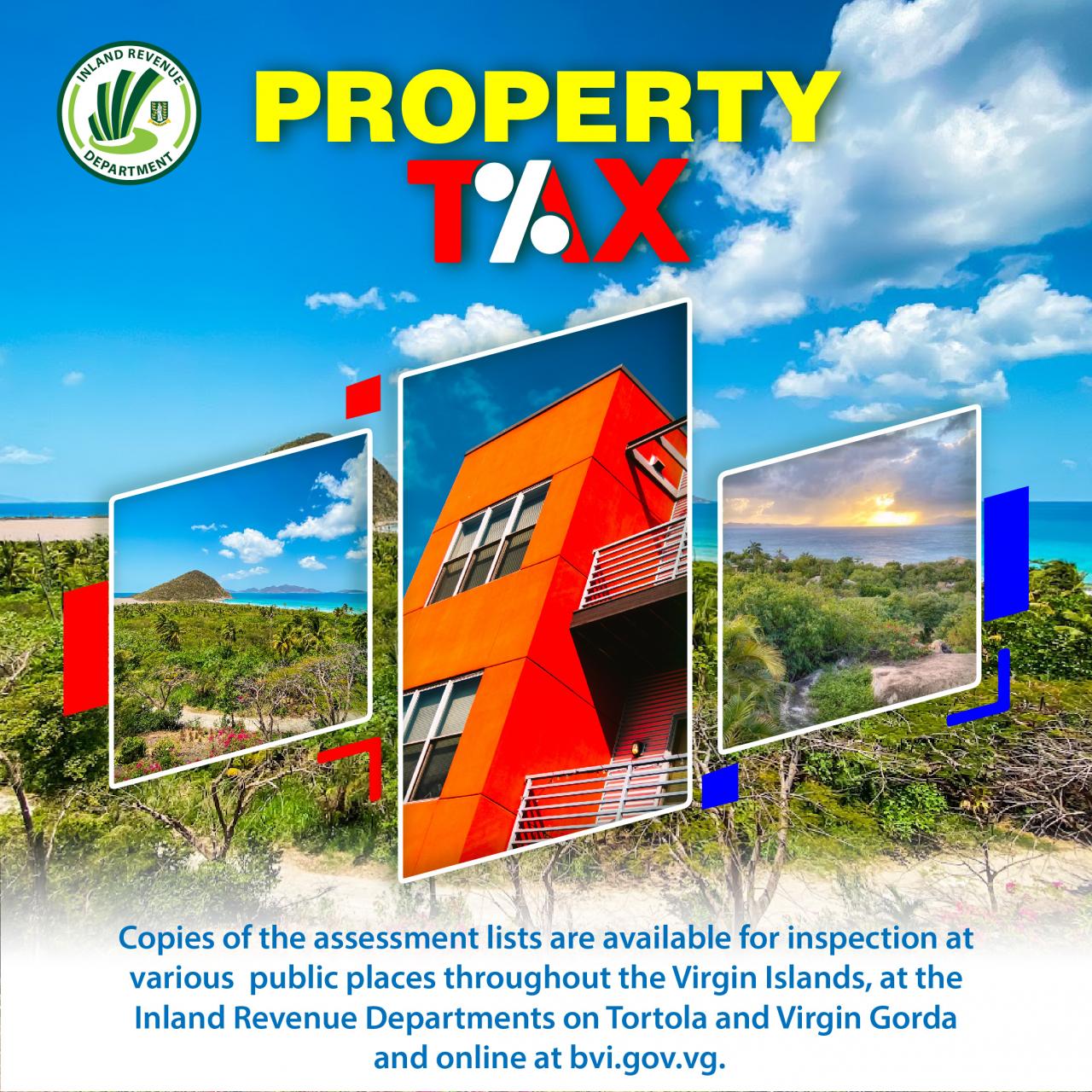Property taxes and ownership regulations in the British Virgin Islands
Property taxes and ownership regulations in the British Virgin Islands are a crucial aspect of understanding the territory’s real estate market. This overview explores the intricacies of property taxation, encompassing assessment methods, applicable rates for residential, commercial, and undeveloped land, and available exemptions and reliefs. Furthermore, we delve into the legal framework governing property ownership, outlining transfer procedures, common legal issues, and the steps involved in transferring ownership.
Understanding these regulations is vital for both residents and prospective investors.
The British Virgin Islands’ unique tax structure and legal landscape present both opportunities and challenges for property owners. The tax rates themselves vary significantly based on property type and location, reflecting the diverse geography and economic activities within the islands. Navigating the transfer process requires careful attention to detail, ensuring compliance with all legal requirements. This comprehensive analysis aims to clarify the complexities involved, providing a clear understanding of the rights and responsibilities associated with property ownership in the BVI.
Property Tax Rates and Assessment Methods in the British Virgin Islands: Property Taxes And Ownership Regulations In The British Virgin Islands

Source: gov.vg
The British Virgin Islands (BVI) boasts a relatively low-tax environment, particularly when compared to many other Caribbean nations. However, understanding the nuances of property taxation is crucial for both residents and investors. This section details the property tax rates, assessment methods, and a comparative analysis with other Caribbean territories.
Understanding property taxes and ownership regulations in the British Virgin Islands is crucial for potential investors. These regulations, often complex, can significantly impact financial planning, much like choosing between travel classes; for example, the decision of whether to opt for business or first class on a flight involves a careful consideration of cost versus comfort, much as detailed in this helpful guide: what is the difference between business and first class luxury flights.
Ultimately, both property investment and flight choices demand thorough research to ensure a worthwhile outcome.
Property Tax Rates in the British Virgin Islands
Property taxes in the BVI are levied annually and are based on the assessed value of the property. The rates vary depending on the type of property – residential, commercial, or undeveloped land – and, to a lesser extent, location. While there isn’t a significant variation in rates based on specific geographic locations within the BVI, the overall assessed value of a property can be influenced by its location, impacting the final tax amount.
Generally, commercial properties tend to have higher tax rates than residential properties, reflecting their higher potential for revenue generation. Undeveloped land typically has the lowest tax rate. Precise rates are subject to change, so it’s advisable to consult the BVI government’s official sources for the most up-to-date information.
Understanding property taxes and ownership regulations in the British Virgin Islands is crucial for potential investors. The complexities involved often necessitate thorough research, and sometimes, a long flight is required to meet with legal professionals. To make that journey more pleasant, consider checking out the top luxury airlines with best in-flight entertainment for a more comfortable experience.
Returning to the matter at hand, navigating the BVI’s legal framework for property ownership requires careful planning and expert advice.
Property Assessment Methods in the British Virgin Islands
The assessment of property values for tax purposes in the BVI involves a multifaceted approach. Several key factors influence the final assessed value:
- Location: Properties in prime locations, such as beachfront areas or within popular tourist destinations, command higher values than those in less desirable areas.
- Size: The total land area and the size of any structures significantly impact the assessed value. Larger properties generally have higher assessments.
- Condition: The overall condition of the property, including the quality of construction, maintenance, and any renovations, plays a crucial role in determining its assessed value. Well-maintained properties with modern amenities tend to be valued higher.
- Amenities: Features such as swimming pools, sea views, and proximity to amenities (schools, hospitals, etc.) can positively influence assessed value.
The assessment process often involves a combination of market analysis, considering recent sales of comparable properties, and physical inspections of the property itself. This approach aims to ensure a fair and accurate assessment of the property’s market value.
Understanding property taxes and ownership regulations in the British Virgin Islands is crucial for potential investors. The costs associated with such ventures can be significant, prompting consideration of other expenses, such as the luxury of travel; for example, one might wonder, how much does a first class flight on emirates cost ? This, in turn, highlights the need for thorough financial planning before committing to property ownership in the BVI.
Comparison with Other Caribbean Territories, Property taxes and ownership regulations in the British Virgin Islands
Compared to some other Caribbean islands, the BVI’s property tax rates are generally considered lower. Islands like Barbados and the Cayman Islands, for example, may have higher property tax rates or more complex assessment methodologies. However, each territory has its unique tax structure influenced by factors such as economic development goals and government revenue requirements. Direct comparison requires careful consideration of each jurisdiction’s specific tax laws and assessment practices.
Understanding property taxes and ownership regulations in the British Virgin Islands is crucial for potential investors. These regulations often impact travel plans, especially if considering significant property purchases. For those looking for a luxurious journey after securing property, researching options like those listed on this helpful site for best luxury airlines for long haul flights to asia is recommended.
Ultimately, careful consideration of both legal frameworks and travel logistics is vital for a smooth and successful investment in the British Virgin Islands.
The BVI’s focus on attracting foreign investment may be a contributing factor to its comparatively lower tax rates on property.
Understanding property taxes and ownership regulations in the British Virgin Islands is crucial for potential investors. These regulations often impact decisions about travel, and sometimes, the need to make a quick trip necessitates considering the finer points of comparing luxury flight experiences between airlines to ensure a comfortable journey. Ultimately, efficient travel planning complements the overall investment strategy in the British Virgin Islands’ property market.
Property Tax Rate Table
| Property Type | Location | Tax Rate | Assessment Method |
|---|---|---|---|
| Residential | Tortola | (Variable, Consult Official Sources) | Market Value Assessment |
| Commercial | Road Town | (Variable, Consult Official Sources) | Market Value Assessment |
| Undeveloped Land | Virgin Gorda | (Variable, Consult Official Sources) | Market Value Assessment |
Exemptions and Reliefs from Property Taxes in the British Virgin Islands
The British Virgin Islands (BVI) tax system, while generally encompassing property taxes, offers several exemptions and reliefs to alleviate the tax burden on certain individuals and properties. Understanding these provisions is crucial for property owners to accurately assess their tax liabilities. These exemptions and reliefs are designed to promote specific economic or social goals within the territory.
Property Tax Exemptions for Certain Properties
The BVI offers property tax exemptions for specific types of properties, aimed at encouraging investment and development in certain sectors. These exemptions are not automatically granted and require applications and approvals by the relevant authorities.
Understanding property taxes and ownership regulations in the British Virgin Islands is crucial for potential investors. The costs associated with acquiring and maintaining luxury properties there can be substantial, leading one to consider if the overall investment is worthwhile, especially when factoring in travel expenses. Perhaps before making such a significant commitment, you should consider whether the luxury of a private jet, as discussed in this article, is it worth it to pay for a luxury flight experience , is a justifiable expense given the other financial obligations involved in owning property in the BVI.
Ultimately, careful financial planning is essential before investing in BVI real estate.
- Government-owned properties: Properties owned by the BVI government are exempt from property taxes. This is a standard practice in many jurisdictions.
- Charitable organizations: Properties owned and used directly by registered charities for their charitable purposes may qualify for exemptions. Eligibility hinges on the charity’s registration status and the property’s direct use in furtherance of the charitable mission. For example, a hospital owned and operated by a registered charity would likely be exempt.
- Religious organizations: Similar to charitable organizations, properties owned and used by registered religious organizations for religious purposes are typically exempt. A church building used solely for religious services would be a clear example.
- Educational institutions: Properties owned and used by registered educational institutions for educational purposes, such as schools and universities, are generally exempt from property taxes. This exemption aims to support the education sector.
Property Tax Reliefs Based on Specific Circumstances
Beyond complete exemptions, the BVI may offer property tax reliefs under certain conditions. These reliefs often involve a reduction in the assessed tax amount rather than a complete exemption.
- Senior citizen relief: The BVI may provide property tax relief to senior citizens who meet specific age and income requirements. This relief aims to ease the tax burden on elderly residents. The specific criteria for eligibility, such as age threshold and income limits, are defined by relevant legislation.
- Disaster relief: In the event of a natural disaster significantly damaging a property, the BVI government might offer temporary or permanent property tax relief. This relief would be contingent upon the extent of the damage and the owner’s demonstrated financial hardship. For example, following a hurricane, owners of severely damaged properties might receive a reduction or waiver of taxes for a specified period.
- Economic hardship relief: In exceptional circumstances, the government may grant property tax relief to individuals experiencing significant economic hardship. This would require a rigorous assessment of the individual’s financial situation and the impact of property taxes on their ability to maintain their property and livelihood. This is usually a case-by-case determination.
Last Point
In conclusion, understanding property taxes and ownership regulations in the British Virgin Islands is paramount for anyone considering investment or residency. The system, while complex, provides a framework for fair assessment and transparent transactions. While the tax rates and assessment methods may differ from other Caribbean territories, the overall aim remains consistent: to ensure a stable and regulated real estate market.
By understanding the intricacies of both taxation and legal procedures, individuals can make informed decisions and navigate the process effectively, ultimately benefiting from the opportunities presented by the BVI’s unique environment.
FAQ Compilation
What are the common methods of paying property taxes in the BVI?
Common methods typically include online payments, bank transfers, and possibly in-person payments at designated government offices. Specific payment methods should be confirmed with the relevant tax authority.
Are there any penalties for late property tax payments?
Yes, late payments usually incur penalties and interest charges. The exact amounts vary and are best confirmed with the BVI’s tax authority.
What recourse is available if I disagree with my property tax assessment?
There are usually channels for appeal or review of property tax assessments. The process should be Artikeld in the BVI’s tax regulations, and seeking legal counsel is advisable.
How long does the property transfer process typically take in the BVI?
The timeframe can vary depending on the complexity of the transaction and the efficiency of the involved parties. It’s advisable to allow ample time for the completion of all necessary legal and administrative procedures.
What types of legal professionals are involved in property transfers in the BVI?
Solicitors or attorneys specializing in real estate law in the BVI are typically involved in property transfers to ensure compliance with legal requirements and to handle the necessary documentation.







